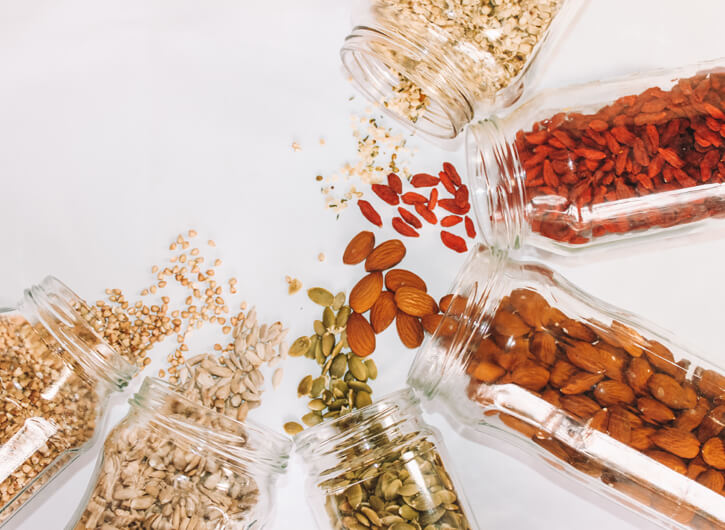While following a vegan diet can be an incredibly healthy way to live, many of the key nutrients that our bodies need to thrive are primarily found in animal products – posing a potential difficulty for health-conscious vegans. Luckily, there are plenty of varieties of nuts that are a lesser-known but equally nutrient rich food. Ahead, we take a look at three reasons that vegans should include nuts in their day-to-day diet.
1. Plenty of Protein
Nuts are an excellent source of protein – an essential nutrient that our bodies need, that non-vegans will usually get from consuming meat and dairy. Protein is important for our bodies because it contains amino acids, which build and repair muscles, bones and other tissues. They also help to produce and maintain our hormones and brain chemicals.
For an active adult, adequate protein intake is especially important. It is recommended that most adults consume 0.75g of protein per kilo of bodyweight per day, and particularly active people may need much more than this, in order to support their bodies working overtime to repair and grow muscle tissue.
For a top tip to boost your protein intake, consider opting for dishes that contain peanuts, almonds or pistachios, three of the most high protein nuts. Popular choices include almond and pistachio-flavored vegan desserts, while those looking for a healthier option can have them with breakfast cereal, or blend them into a fruit smoothie. Peanuts are a healthy ingredient in many sauces, and also make for a flavorsome curry dish.
2. Great Source of Omega-3
Omega-3 is a group of polyunsaturated fats, generally known for its abundance in fish oils. Essentially, omega-3 fats help to maintain our cell membranes and cell receptors, which are responsible for a whole host of bodily processes, such as regulating blood clotting, controlling inflammation, and potentially reducing cholesterol levels.
Because vegans don’t eat fish, they need to consume omega-3 from other sources. Some people choose to purchase cereals with added omega-3, while others take supplements. But ultimately, the easiest way for vegans to get the omega-3 that they need, is through the consumption of nuts. Walnuts in particular have a very high content of this healthy fat, containing about 2.5g in a one-ounce serving.
Walnuts are often enjoyed in vegan cakes and chocolates, but for a healthier dish, they can be added to a salad with apples and greens, or baked into whole grain bread.
3. Variety of Vitamins and Minerals
It’s no wonder that nuts are widely considered a superfood, with the extensive number of vitamins and minerals that they contain, including (but not limited to) vitamins E and B6, magnesium, zinc, folate and potassium.
Vegans can particularly benefit from the high selenium content in nuts, which is usually found in eggs, fish and meat – as well as calcium, which non-vegans would generally get from dairy products. While selenium helps to produce DNA and protect our cells, calcium is important for muscle function, heart health and bone health.
Brazil nuts are a good source of selenium, and are often enjoyed as an ingredient in vegan banana bread and pancakes – as well as more nutritious, savory snacks like burritos. Almonds contain plenty of calcium, and are a popular ingredient for tagines, stews and pasta dishes.
Overall
Nuts make a wonderful vegan diet staple as they have numerous health benefits and are so widely available – in fact, wherever you are in the world, you are bound to find a tasty, nut-containing dish. As well as this, there are plenty of varieties of nuts to choose from, meaning that vegans can enjoy a whole range of tantalizing flavors, whilst still reaping the many nutritional benefits.
Geoff Aldis is a Freelance Content Producer and Researcher.



